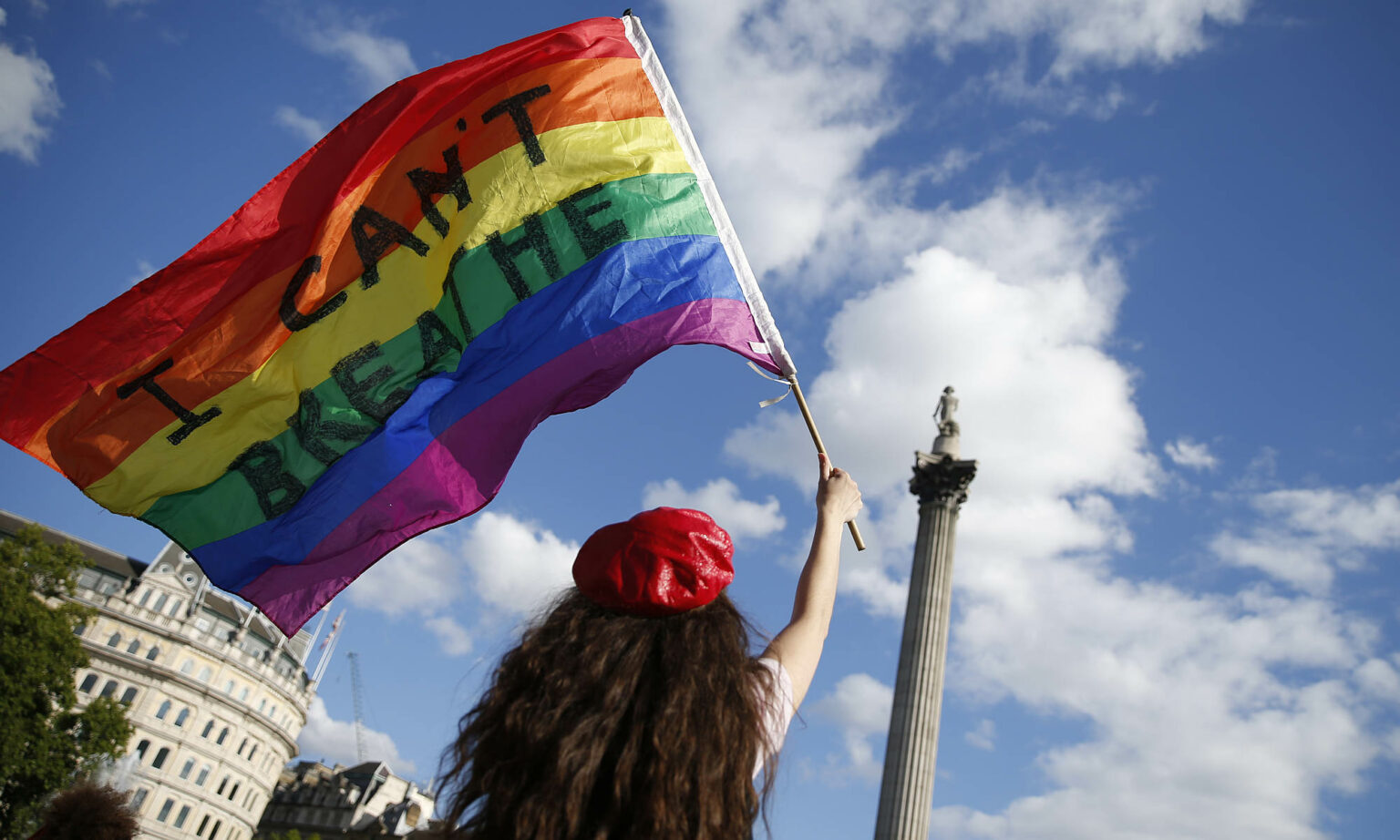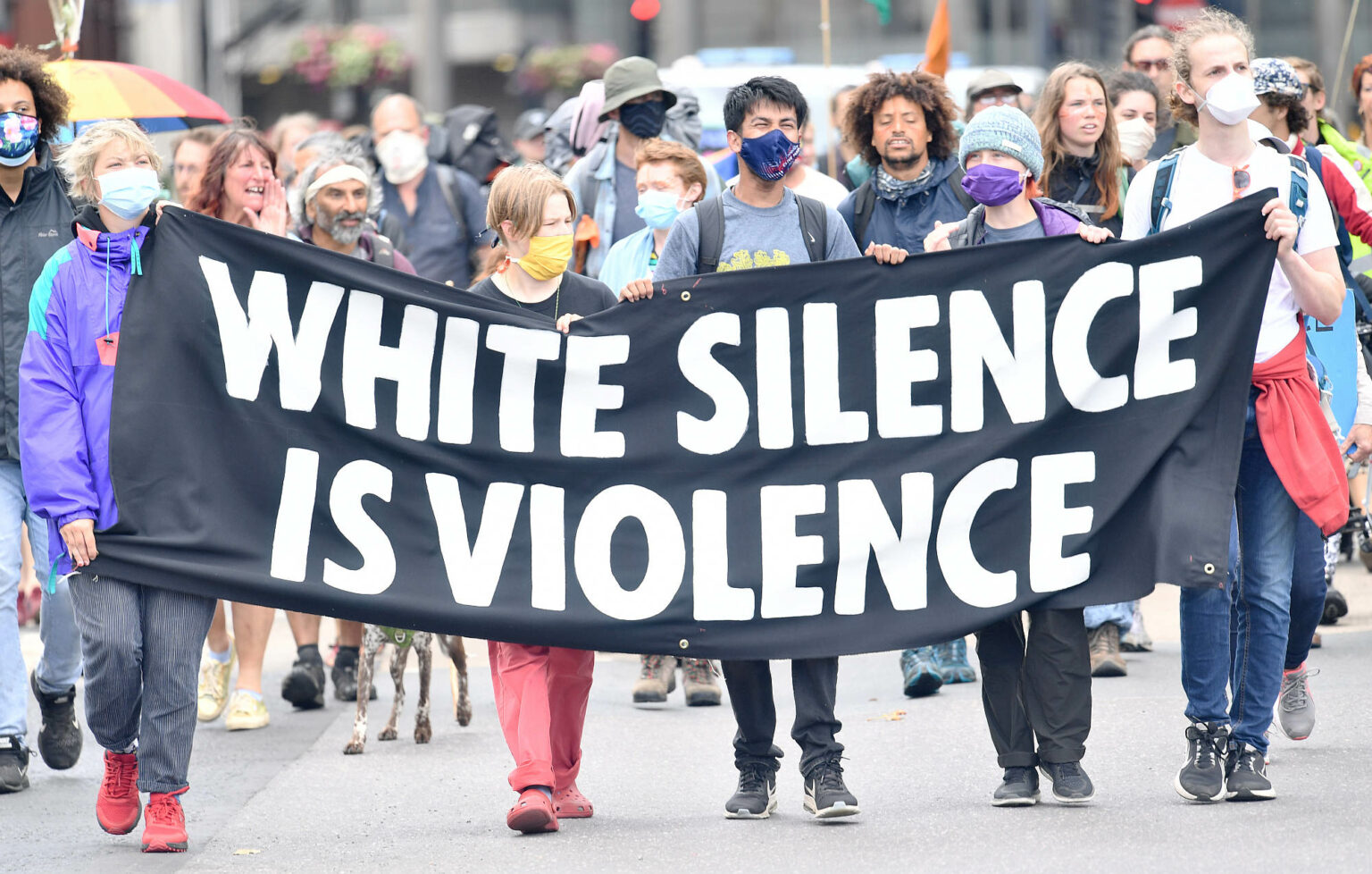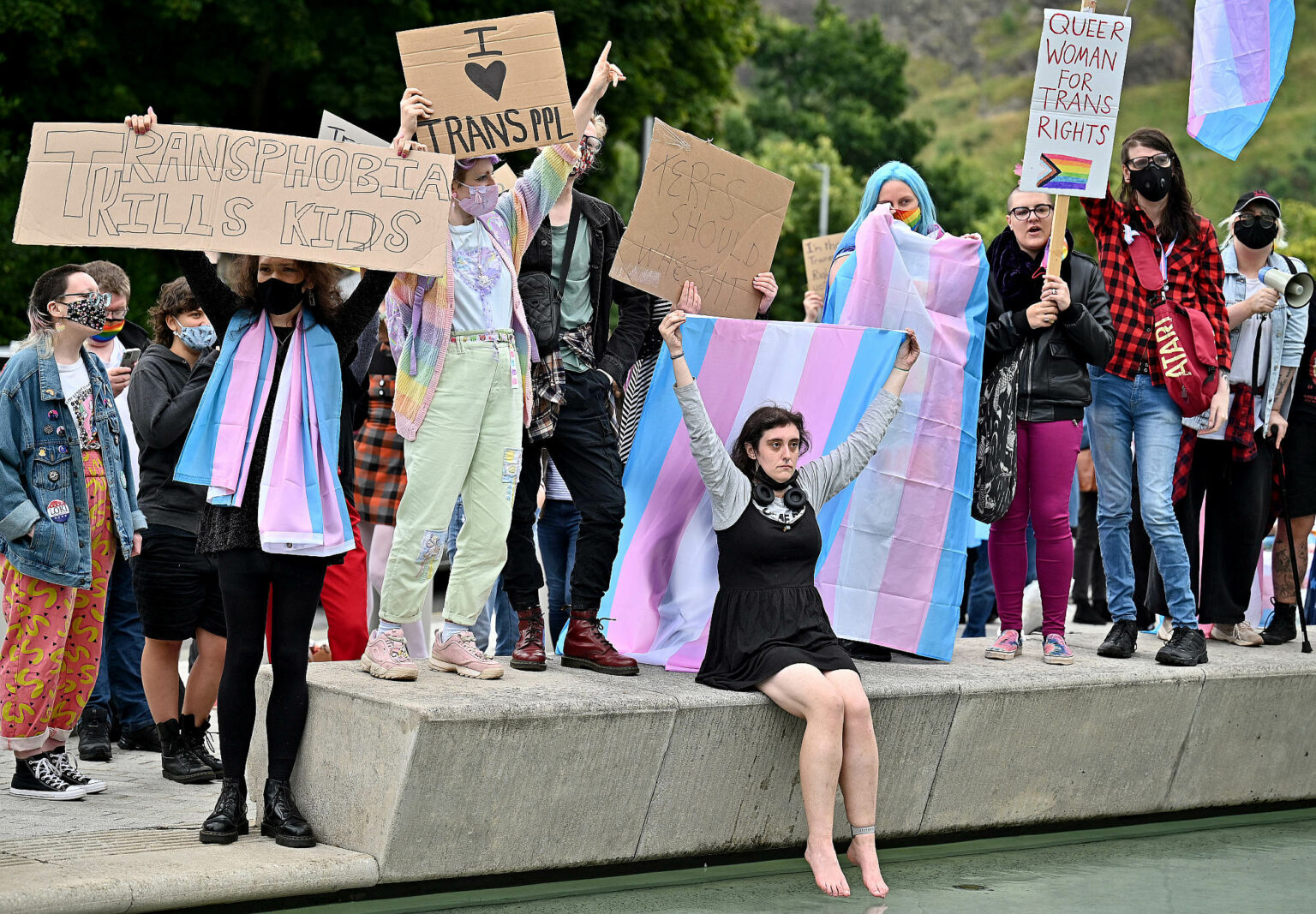
Long-read
The left-wing case against identity politics
It is time progressives stood up to the racism, classism and misogyny of wokeness.
Want to read spiked ad-free? Become a spiked supporter.
The Identity Myth by David Swift is a fun and clever book. It’s a counterblast to the Flapper Girl socialism of Novara Media. It brilliantly dismantles the ‘NeoOrientalism’ of the identitarian left. It lights a fire under the arse of the graduate left who say, without a flicker of shame, that 65-year-old working-class people who own their homes are the new propertied elite while posh twentysomethings with PhDs who pay sky-high rents in hip Hackney are the new proles. If you’ve ever found yourself wondering how the left lost the plot, how a movement founded to represent the interests of the working class ended up treating the working class as a lost, hopeless, mostly racist cause, you could do worse than start here.
Mr Swift is a historian and author. His previous book was A Left for Itself: Left-Wing Hobbyists and Performative Radicalism, which also had much to recommend it. This book is better, in my view. It’s a deep dive into the identitarianism that has almost entirely replaced the universalism that was once the left’s USP. It’s a cry to re-elevate the commonality of class above the internecine squabbles unleashed by identity politics and its irresponsible parent – neoliberalism. Swift makes the case for ending ‘the obsession with identity, hierarchies of victimhood and quick emotional responses’ in favour of bringing back ‘structural analysis and an appreciation of complexity’. And he makes it well.
The book is split into four parts: class, race, sex and generation. The section on race is the most explosive. It opens with that remarkable line from Frantz Fanon: ‘The man who adores the Negro is as sick as the man who abominates him.’ Swift deftly breaks down the homogenising tendency of identity politics, where entire races come to be seen as cool and fascinating (black people, mainly) and others as square and probably prejudiced (whites). If only there were a word to describe treating human beings as monolithic blocs of decency or vice on the basis of their skin colour. The neo-racialism of the woke set may be ‘well-intentioned’, unlike the biological racism of old, says Swift, but no matter – it still has ‘the effect of exoticising and patronising the people it is ostensibly meant to benefit’.
The race part opens with a wonderful anecdote. Swift recalls a brilliant, disabled student he knew, called Mohammed. One day, in a class on the theory of justice, the professor called on Mohammed to give his views to the class, only she ‘pronounced [Mohammed] with a hard guttural sound on the “h”’. Which was weird, first because Mohammed’s family are Urdu speakers, and they don’t pronounce Mohammed like that, and second because Mohammed hails from the East Midlands and he said his name in the same East Midlands accent with which he said everything else. ‘[Why] did she exoticise his name in this way?’, asks Swift. That prof isn’t alone. There’s Jeremy Corbyn, too, who frequently uses a ‘hammy Yiddish inflection’ when pronouncing Jewish names, says Swift, ‘so that Harvey Weinstein became Harvey Vine-Shtein and Jeffrey Epstein became Jeffrey Ep-Shtein’.
In Corbyn’s case, people read it as anti-Semitism. Swift sees something else: Corbyn was trying to show ‘his learning and cultural sensitivity’. I am an aware person and I understand your race, Corbyn was essentially saying, just as that professor was when she foreignised poor Mohammed. ‘[B]oth were aiming to impress on everyone listening the extent and the breadth of their cultural sympathies’, says Swift. The entirely predictable consequence, though, is the further cultural segregation – ‘exoticisation’ – of people on the basis of their racial or religious heritage.

This is identity politics in action. It is fundamentally a process of re-racialisation. It deploys ‘catch-all terms’ for ethnic-minority people that ‘flatten and homogenise the multi-varied lives and experiences of millions of people’, says Swift. He refers to it as ‘NeoOrientalism’, using, to good effect, Edward Said’s theories in his classic work Orientalism to understand the racial paternalism of the 21st-century left. Too many today engage in a ‘political essentialisation of people of colour’, he says. Black and brown people are ‘assumed to have a homogeneously radical politics’, to such an extent that if they ever vote for conservative parties – or Heaven forfend, Brexit, as did an estimated 27 per cent of black Britons, 30 per cent of Chinese Britons and 33 per cent of South Asian Britons – then clearly Something Has Gone Wrong. Maybe they’re Uncle Toms?
Swift demolishes the idea that all black, brown and immigrant people are rad, that these complex communities are Guardian or NYT editorials made flesh. ‘[The] opinions of many Nigerians in Plaistow or Poles in Ealing – on race, gender, LGBT issues and, perhaps surprisingly, immigration – would make Barry the Brexit voter from Bolsover seem like Judith Butler’, he says. He points out that of the people who emigrated to the UK before 1970, 48 per cent now want immigration to be reduced ‘a lot’. A few years ago a study found that Muslims in the UK are ‘the most patriotic in Europe’: 78 per cent identified with their nation, compared with just 49 per cent of Muslims in France and 23 per cent in Germany. Bad news for those identity patricians who view Muslims as little more than bit-part players in sad newspaper columns on racism. Then there’s London. The contemporary left loves to big up London as a hyper-cool melting pot of laid-back thinking. Yet London is actually pretty theistic: 62 per cent of Londoners describe themselves as religious compared with 53 per cent in the rest of the country. Twenty-five per cent of Londoners attend a religious service at least once a month, compared with one in 10 outside of London. So, not surprisingly, many Londoners have ‘uncool’ views. A quarter say sex before marriage is wrong, compared with 13 per cent of folk outside of London.
Swift’s book is packed with stats, quotes and info like this that will surprise you if, in his words, ‘you’ve been spending too much time in a milieu dominated by middle-class white post-graduates’ or if you ‘assume that the black people featured on distinctively left-liberal newspapers and media are representative of black people as a whole, rather than being distinctively left-wing’. (He points out that just two per cent of the readership of the New York Times is black. Oof.) The racial homogenisation of people of colour as being more ‘progressive’ than white people falls down as hard in the US as it does in the UK. A University of Virginia study of Hispanic and Asian people who voted for Trump found that more than half agreed that the US should ‘protect and preserve its white European heritage’. A 2017 Pew survey found that 91 per cent of whites who described themselves as ‘solidly liberal’ thought that discrimination was the main reason blacks cannot get ahead, while only 40 per cent of the ‘devout and diverse’ group (ethnic-minority people who identify as religious) agreed.
And let’s not forget Proposition 8 in California in 2008, which banned same-sex marriage. That was supported by a majority of Latinos and half of African Americans. Swift’s point is not to depict ethnic-minority people as backward or ‘phobic’ but rather to illustrate the political and moral diversity of these peoples who are too often homogenised as more ‘aware’ than whites by the ruthlessly racialising dynamic of identity politics.
He tackles ‘cultural essentialism’, too. The creepy cultural worship of people of colour as cooler and sexier than drab whites has been around for a long time, of course. He cites Kerouac, who once took a walk ‘in the Denver coloured section wishing I were a Negro, feeling that the best the white world has offered me was not enough ecstasy for me, not enough life, joy, kicks, darkness, music’. Such cultural cringe is ‘resurgent’ once more, says Swift. Among identitarians there is a ‘glorification of “black culture”’ as more authentic, more real, than ‘white culture’. This further essentialises the races and limits the sense of what black people are capable of – aren’t they just for entertainment, not intellect or politics? At its basest, this cultural essentialisation leads to a situation where Stormzy comes to be seen as more properly black than, say, Kemi Badenoch. In promoting the idea that blacks in general are ‘cooler and more talented’ than other racial blocs, identitarians engage in an updated version of those old racial tales about blacks being ‘inherently athletic or… well-endowed’, says Swift.

It is a classic example of what the black British sociologist Paul Gilroy referred to as the ‘postmodern translation of blackness from a badge of insult into an increasingly powerful but still very limited signifier of prestige’. Swift makes clear that he is not making a case against so-called ‘cultural appropriation’. ‘Picking and choosing from the cultural smorgasbord of the modern, globalised world’ is fine, he says. Eat your ramen, do your yoga, braid your hair, that’s all okay. No, the problem with the cultural deification of blacks in particular is its imprisonment of black people into an essentialised coolness that is largely created for the benefit of influential white graduates keen to distinguish themselves from the lameness of ‘whiteness’.
And, of course, there are some very significant aspects of ‘black culture’ that the essentialisers ignore. Primarily, faith. ‘A key aspect of NeoOrientalism is its failure to appreciate the significance of religion – particularly Christianity – to so many black and brown people in Britain and the USA’, says Swift. He mentions Beyonce, a firm believer in God (and marriage, too – ‘If you liked it, you should have put a ring on it’). Yet identitarians who worship her ignore this fact. This is a killer observation from Swift: ‘Given how much of the politico-cultural identity of young NeoOrientalist women – from their acrylic nails to their “Slay Queen!” social-media patter and their “Educate Yourself!” BLM posts – is appropriated hook, line and sinker from African-American culture, it is curious they ignore arguably the most important aspect of that culture.’
Swift’s issue with NeoOrientalism is that it is fundamentally anti-left, if we take ‘left’ to mean what it used to mean – working people making common cause to demand better pay and conditions and greater say-so in the organisation of both their workplaces and society. NeoOrientalism ‘undermines universalism, solidarity and comradeship’, he says. This is the thread that runs through the book: how ‘wokeness’, or whatever we’re meant to call it, grates against an older politics which held precisely that what we share in common is more important than the petty issues of pigmentation, sex, sexual desire and faith that appear to separate us.
The section on sex is good. Though there is a very disappointing bit where Swift basically opts out of one of the most pressing identity issues of our time: whether men should be allowed to self-identity as women. ‘On the issue of self-ID, and whether people should be able legally to change their gender without medical intervention, I’m staying well clear’, he says. Come on, man! Many women have bravely risen to the occasion and made the case for reason and rights against the nonsense of self-ID – the very least us blokes can do is offer them some of that old-fashioned solidarity. Nonetheless, Swift does make mincemeat of the crankier claims of sexual identitarians. He notes there is now a special Pride flag for people who indulge in ‘Pup Play’ – ie, who dress up as dogs. This is an insult to gay people who fought hard, against both state repression and street violence, for their rights, he says. ‘I am pretty sure that no one has ever been killed for dressing up as a dog.’
Then there’s the ridiculous flexibility of a term like ‘queer’. Queerness can now be claimed by anyone desperately seeking a ‘victimised identity’. It allows even straight people to ‘claim a sort of shared identity with gay people’, says Swift. As for the inclusion of ‘kinky’ people and ‘asexuals’ in the LGBTetc rainbow – he quotes the lesbian writer Sophie Wilkinson: ‘I don’t think anyone walks down the street and gets, “Oh, you fucking asexual”.’ In these chapters on sex, as elsewhere in the book, Swift captures one of the key elements of contemporary idenitity politics – the valorisation of victimhood, and the subsequent seeking out of victimhood even by people whose lives are comfortable and privileged. When victimhood is sanctified, it isn’t surprising that straight, posh, well-connected activists and journalists feel the urge to declare: ‘I’m a genderqueer non-binary neurodivergent person.’ In this way, identity politics isn’t only daft — it is also the new means through which sections of the middle classes fortify their moral authority in relation to the rest of society. It serves the class interests of the identitarian elites by providing them with readymade victim narratives that bolster their saleability as commentators and as enforcers of the edicts of the professional-managerial class.

Speaking of class, I found that section of the book the most interesting but also the most frustrating. There are some good observations. Swift attacks the new-left school of thought that says ‘the “traditional” working class is no longer fit to be described as such, having lost their right to the title due to their age, homeownership and political views. According to this school of thought, the “real” working class are young, metropolitan, private renters who remain overwhelmingly supportive of Labour or Democratic parties.’ This flagrant attempt by overeducated middle-class activists to redefine the working class is irritating in the extreme. On many occasions I’ve found myself in media discussions with plummy Corbynistas who genuinely want to convince me that my working-class immigrant father who managed to buy his council house under Thatcher – the horror! – is a member of the propertied elite, while they, poor little university-educated strugglers, are the new proletariat. It is classism, ironically engaged in by the kind of people who would scream ‘Erasure!’ at any other effort to sideline a social group’s experiences and difficulties.
Swift also makes a good point about the politics of pity that is rife in new-left circles. So where the identity left will clutch its pearls over any utterance of a word like ‘chav’ – hello, Owen Jones – such words are ‘still used… by millions of working-class people every day’, says Swift. This is true. There is a sense of frustration in working-class communities – sometimes healthy, sometimes not – with those who are considered not to be pulling their weight and those who engage in anti-social behaviour in the community. That’s what ‘chav’ means. That this c-word so repulses bourgeois leftists like Jones tells us more about such people’s paternalism towards the little people than it does about the linguistic or moral realities of life in working-class communities. Swift also tackles the left-wing idea that Brexit was a fundamentally upper-class project that the working classes dumbly got dragged into, which outrageously erases the agency of those vast numbers of working people who consciously (and in my view, brilliantly) voted to free the UK from the racist, neoliberal EU.
And yet. Swift, in his chapters on class, risks partaking in the kind of victimology he criticises elsewhere. At times it seems that, for him, being working class means having a very difficult life. He calls for an understanding of class on the basis of material deprivation rather than culture, which sounds sensible, but it also raises the question: material deprivation? That’s it? Class still brings ‘threats to life, health and prosperity’, he says. He favourably quotes Edouard Louis, who said ‘politics is what separates some populations, whose lives are supported, nurtured, protected, from other populations, who are exposed to death, to persecution, to murder’. Not one of the working-class people I grew up with would describe themselves as persecuted, far less as facing ‘threats to life’ or ‘exposure to death’. My concern is that a narrow focus on the material issues of class both exaggerates the difficulty of working-class life (most working-class people have nice lives) and, more importantly, draws attention away from what ought to be the overriding question of class politics: not bank balances, but power. Most importantly, democratic power.
Indeed, there is a problem with treating class as an identity at all. Of course there are cultural aspects to growing up in a working-class community that are very distinctive. A memorable moment for me when I made my youthful move into political activism was the look of shock on the face of a middle-class friend in the Revolutionary Communist Party when I asked ‘What’s The Archers?’ after she had spent 10 minutes telling me about its latest storyline. But class is not just culture or money (or lack thereof). It is not just identity, either (a point Swift recognises, and makes). Class, in fact, is the antidote to identitarianism. Working-class universalism poses an existential challenge to the cynical divisions of identity politics. And its strength, its labour, is really the only force capable of confronting and isolating the neoliberal identitarian elites and their policies of divide and rule. The traditions of working-class solidarity and democratic scepticism would be very well deployed against identity, and against the racism, classism and misogyny of wokeness. Swift’s book is a strong start in making the case for this new solidarity.
Brendan O’Neill is spiked’s chief political writer and host of the spiked podcast, The Brendan O’Neill Show. Subscribe to the podcast here. And find Brendan on Instagram: @burntoakboy
The Identity Myth: Why We Need to Embrace Our Differences to Beat Inequality, by David Swift, is published by Constable. (Order this book here.)
Pictures by: Getty Images.
Who funds spiked? You do
We are funded by you. And in this era of cancel culture and advertiser boycotts, we rely on your donations more than ever. Seventy per cent of our revenue comes from our readers’ donations – the vast majority giving just £5 per month. If you make a regular donation – of £5 a month or £50 a year – you can become a and enjoy:
–Ad-free reading
–Exclusive events
–Access to our comments section
It’s the best way to keep spiked going – and growing. Thank you!







Comments
Want to join the conversation?
Only spiked supporters and patrons, who donate regularly to us, can comment on our articles.